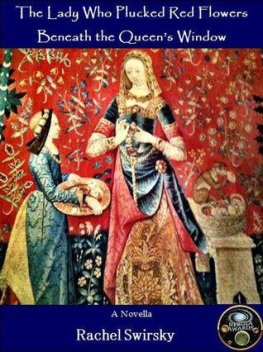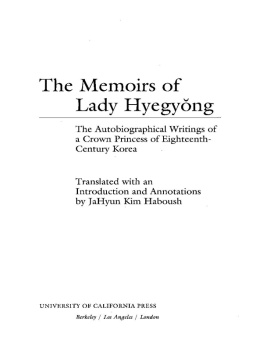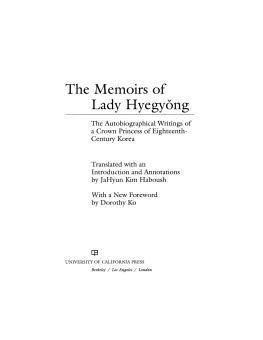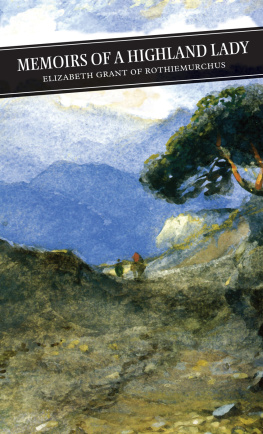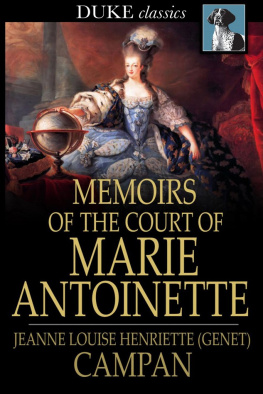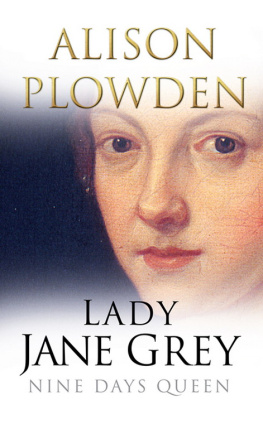Memoirs of the Red Queen
The Book and the Author
Translated into English from the Korean script (han'gul), the memoir of Lady Hong (17351815) of Hyegyong Palace is an autobiographical memoir. Known as Hanjung nok and dated 1796, it was prepared over a period of about eleven years, in the twilight years of Lady Hong's life as a vivid account of her personal life and its great tragedy. It is a compelling story, told in retrospect, of a young girl's introduction to court life, of her selection as a royal consort at the early age of ten, and the happy and sad times throughout her life.
Lady Hong tells of her early fears on entering the court and how she came to terms with the deprivations which existed within the palace walls. It is a tale of quiet courage, aimed not at self-preservation and well-being, but at the safety of those close to her, whom she loved dearly. The memoir carries a main vein of woman's subservience to male rulers who were moulded by Confucian ideology, although Lady Hong's fortitude and resolution come through strongly in trying to prevent, or at least delay, her husband's inevitable demise.
The translator
The translation was undertaken by Yang-hi Choe-Wall as a part of her academic work at the Australian National University in Canberra. She was encouraged by her colleagues to adapt the translation for the general reader and the publication of this book is the result. Dr. Choe-Wall was born in Seoul, Korea, the fourth child of a family whose head was a distinguished professor of English Literature. Later she subsequently moved with her two children to Australia.
Memoirs of the Red Queen
The Crown Princess' Own Story
By
Lady Hong
Translated by
Yang-hi Choe-Wall
First published in 2004 by
Kegan Paul International
This edition first published in 2011 by
Routledge
2 Park Square, Milton Park, Abingdon, Oxon, OX14 4RN
Simultaneously published in the USA and Canada
by Routledge
711 Third Avenue, New York, NY 10017
Routledge is an imprint of the Taylor & Francis Group, an informa business
Kegan Paul, 2004
All rights reserved. No part of this book may be reprinted or reproduced or utilised in any form or by any electronic, mechanical, or other means, now known or hereafter invented, including photocopying and recording, or in any information storage or retrieval system, without permission in writing from the publishers.
British Library Cataloguing in Publication Data
A catalogue record for this book is available from the British Library
ISBN 10: 0-7103 -1159-1 (hbk)
ISBN 13: 978-0-7103 -1159-7 (hbk)
Publisher's Note
The publisher has gone to great lengths to ensure the quality of this reprint but points out that some imperfect ions in the original copies may be apparent. The publisher has made every effort to contact original copyright holders and would welcome correspondence from those they have been unable to trace.
Contents
Publisher's Note
Originally written around 1796 in Korean, Lady Hong's memoir was published in English in 1985 as part of our Korean Culture Series. The tragic autobiography of the Crown Princess speaks as movingly and directly to us today as it has done to all generations of Koreans who came after her. When we began publishing more extensively on Korea in the 1980s, very little material was available on that strange kingdom which is now a republic, or at least half of one.
Isabella Bird was almost the first Westerner to visit that land, which resulted in the publication of her very successful book entitled Korea and her Neighbours also published by Kegan Paul. Originally published in 1898, the book, by possibly the most successful female travel writer of all time, gave an in-depth account of what is a very distinctive and almost undiscovered place with an unique culture and very strong traditions. Basically, Confusionism lives here.
Korea and its culture are now becoming the subject of more international interest, helped by such things as the Olympics of 1988, the taste for Korean cuisine and Shijo poetry, the new haiku, amongst other things Korean and the Seoul World Cup of 2002. People who already know Japan, China, and other parts of South-East Asia are increasingly turning their attention to what was called in the late nineteenth century the hermit nation.
This and the recent publication of Margaret Drabble's book The Red Queen which was inspired by the autobiography of the remarkable Lady Hong has prompted us to issue a new edition of the original work. Here, the Princess speaks directly to you. As Miss. Drabble says in her prologue to The Red Queen It is sheer chance that the Crown Princess came my way at all, but, once I met her, I could not get her out of my mind.
Bloomsbury
August 2004
Note: Roger Tennant's straightforward A History of Korea (Kegan Paul, 1996) will give those who are interested a good account of that still private land.
Preface
This book is a revision of a thesis submitted some years ago to the Australian National University in Canberra as part of the requirements for the degree of Master of Arts. The thesis, Hanjung nok with Introduction and Annotation, is housed in the University Library. Those readers who desire a fuller translation with detailed annotations and appendices are referred to it.
Both Professor A. L. Basham, then Head of the Department of Asian Civilizations at the Australian National University, and my thesis supervisor Dr K. H. J. Gardiner encouraged me to rewrite the work and adapt it for the general reader, and I am grateful to them for their help and guidance.
My most heartfelt thanks are also due to Dr J. Brewster for her great help with the revision and subsequent composition. I am particularly indebted to her.
Finally, my acknowledgements would not be complete without special reference to my family. My husband, Ray, gave his constant support and invaluable co-operation. My children, Dai kyu and Mikyung, showed a marked degree of patience during the preparation of both thesis and book. Without it, this book could not have been written.
Yang-hi Choe-Wall
Editorial Note
In order to keep the narrative as clear as possible, most important official titles are given English translations. Persons mentioned in the text are listed with dates, offices held and other details in Appendix I. In Appendix II maps are provided of the Court at the time of King Yngio, as an aid to following the many references to places.
All Korean words used in this narrative are transliterated according to the system of McCune-Reischauer.
In this translation the mark

has been translated as

throughout.
Introduction
The memoir of Lady Hong of Hyegyng Palace (Hanjung nok, 1796) is one of the rare historical examples of literary composition by a Korean woman of the Yi dynasty (13921910).
A product of neo-Confucian court society of the late eighteenth century, this autobiographical memoir gives a vivid account of court life in the time of King Yngjo (reigned 17251776). Not only a touching description of the tragic incidents involving Lady Hong's family, it is also a valuable disclosure of the rigidity of the royal court, as well as a vital historical source. Its elegant prose and insight into human behaviour is seldom found in works by male authors of the same period. The memoir is also one of the few works of the time written in


 has been translated as
has been translated as  throughout.
throughout.
